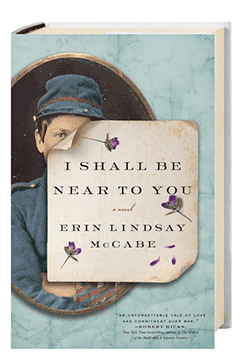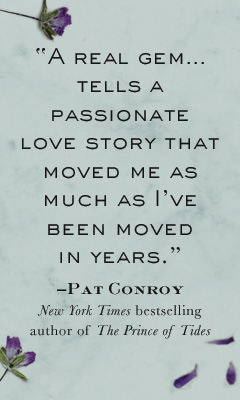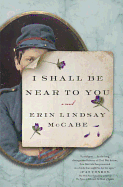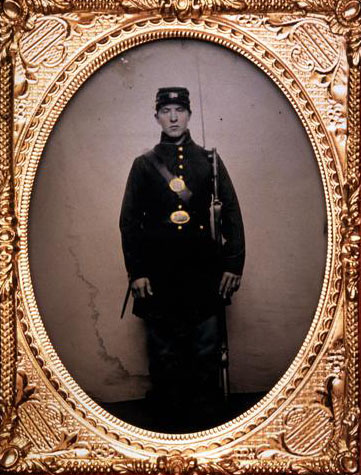I Shall Be Near to You
by Erin Lindsay McCabe
While American history will remember the current decade as one that saw a lift on restrictions that kept women from serving in frontline combat, many Americans already have no memory of a time when women weren't allowed to serve in the military. Erin Lindsay McCabe's quietly fierce debut transports readers back to 1862, a time when women in military uniforms were unthinkable, to meet a young bride who defied society to serve alongside the love of her life.
Rosetta has never fit the mold of a perfect lady. Unlike her more feminine sister, she balks at being trapped in the house sewing and is her Papa's "only son," more interested in farm chores than learning the art of life as a farmwife. When she marries her longtime sweetheart, Jeremiah, she can't help noticing this about her new sisters-in-law: "Alice and Sarah ain't a thing like me. Alice is big eyed and Sarah is quiet and both of them ain't a thing but gentle." When she's with Jeremiah, though, Rosetta feels loved and beautiful. Unfortunately, their wedding is precipitated by Jeremiah's enlistment in the Union Army and the appeal to both of them of widowhood versus spinsterhood should he not return from battle: Rosetta won't have Jeremiah leave her "like nothing" and Jeremiah will know his wages will go to her in the event of his death. But when their happy honeymoon ends quickly with his deployment, Rosetta comes to realize she doesn't just need marriage; she needs the husband she loves. Not only does she miss him fiercely in their empty house, she finds herself fending off sexual assault--albeit successfully--and coping with the pointed demands of a mother-in-law who sees Rosetta as a set of extra hands for women's work. When Rosetta offers to help the men instead, she is told, "You'd do better to remember you've come up in the world and do what you're asked."
In a flash of inspiration, Rosetta realizes that the only way to stop the pain of parting with Jeremiah is to reunite with him, to follow him even into the jaws of war. She knows some wives follow their enlisted husbands to camp and even earn a few pennies taking in laundry, but she would still find herself left behind should the soldiers be called into battle. The only way Rosetta can truly be with Jeremiah is to become a soldier herself, which carries the added benefit of a soldier's pay. With so many beardless youngsters enlisting, passing as male isn't terribly difficult. One haircut and one duped enlistment officer later, Rosetta is reborn as Ross, Union soldier, and her reunion with Jeremiah is complete. However, Rosetta's choices might not solve her problems as neatly as she imagined. Jeremiah has always loved her for herself and even taught her to throw a punch when they were younger, but a wife on the front lines might be more than even he can accept. Not only does she need his acceptance, Rosetta also needs the silence of their friends and neighbors from home who have enlisted with Jeremiah. Her deception may have fooled the enlistment personnel, but now she must continue the ruse every second of every day or face possible accusations of treason if she is discovered. Even if she can keep up appearances, all of their problems will seem beside the point if either she or Jeremiah falls to the life-ending machine that is the Civil War.
McCabe's strength clearly lies in creating characters of emotional depth and complexity. Rosetta's frank yet graceful voice will mesmerize readers. McCabe beautifully captures the rhythm of an older, more agrarian Northeastern accent without allowing the speech pattern to become a distraction. Instead, the reader simply hears the forthright, stubborn, and immensely strong heart of Rosetta, and although one may at times wish for the ability to save her from the inevitable pains her choices must bring, her determination makes it impossible not to follow her journey to its end. While Rosetta's larger-than-life personality may relegate all other characters to secondary standing, they each have their own layers. Rosetta's husband, Jeremiah, struggles realistically between his love for Rosetta and desire to support her independent spirit and his sense that what she's done breaks all bounds of propriety. Even more importantly, while Jeremiah might be ahead of society in accepting Rosetta's strength, he remains a man of his time in that he considers her protection his responsibility, and her very presence makes his task nearly impossible. Their fellow soldier Will befriends "Ross," but it's the revelation of his own secret that cements his friendship with Rosetta.
While Rosetta does train with the men and battle scenes play an important role in the plot, McCabe avoids the trap of turning her heroine into an action hero and instead gives Rosetta a highly realistic experience, largely shaped by the sharp-eyed captain's wife who sees through Rosetta's disguise and conscripts her to tend the wounded, a task Rosetta is no more suited for than needlework, but one that allows both heroine and reader an impactful look at the pain and loss of war. Although Rosetta lives on the Northern side of the Mason-Dixon line, she is able to recognize the tragedy of deaths on both sides, as well as the courage and cunning of a female Confederate spy. Rather than victory, showy heroism or the morality of one viewpoint over another, McCabe emphasizes a less direct bravery born of real love and the struggle to find individuality in a world of convention. While military standards may have changed, such themes provide the groundwork for any timeless story, including this one. --Jaclyn Fulwood









 Tell us about your research on the female soldiers who inspired this novel.
Tell us about your research on the female soldiers who inspired this novel.